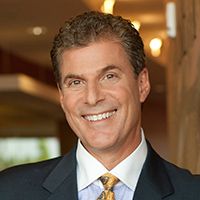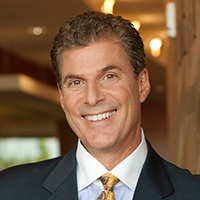To Make a Financial Plan, You Need a Financial Purpose
Five questions to ask yourself to identify what’s really important to you, your future and your legacy.


Profit and prosper with the best of Kiplinger's advice on investing, taxes, retirement, personal finance and much more. Delivered daily. Enter your email in the box and click Sign Me Up.
You are now subscribed
Your newsletter sign-up was successful
Want to add more newsletters?

Delivered daily
Kiplinger Today
Profit and prosper with the best of Kiplinger's advice on investing, taxes, retirement, personal finance and much more delivered daily. Smart money moves start here.

Sent five days a week
Kiplinger A Step Ahead
Get practical help to make better financial decisions in your everyday life, from spending to savings on top deals.

Delivered daily
Kiplinger Closing Bell
Get today's biggest financial and investing headlines delivered to your inbox every day the U.S. stock market is open.

Sent twice a week
Kiplinger Adviser Intel
Financial pros across the country share best practices and fresh tactics to preserve and grow your wealth.

Delivered weekly
Kiplinger Tax Tips
Trim your federal and state tax bills with practical tax-planning and tax-cutting strategies.

Sent twice a week
Kiplinger Retirement Tips
Your twice-a-week guide to planning and enjoying a financially secure and richly rewarding retirement

Sent bimonthly.
Kiplinger Adviser Angle
Insights for advisers, wealth managers and other financial professionals.

Sent twice a week
Kiplinger Investing Weekly
Your twice-a-week roundup of promising stocks, funds, companies and industries you should consider, ones you should avoid, and why.

Sent weekly for six weeks
Kiplinger Invest for Retirement
Your step-by-step six-part series on how to invest for retirement, from devising a successful strategy to exactly which investments to choose.
What is meant by “purpose-driven finances”?
It simply means that money and wealth are just numbers on a ledger; they are nothing without a purpose attached to them.
In retirement, that purpose is different for everyone. But remember, this is not about rate of returns. Instead, the question is, “What do you want the wealth you have accumulated to do for you in retirement?” When I ask people that, most often their responses include maintaining a comfortable lifestyle, giving to charity or providing for their family. However, as the retirement years pass, the purpose for the money can change as circumstances change.
From just $107.88 $24.99 for Kiplinger Personal Finance
Become a smarter, better informed investor. Subscribe from just $107.88 $24.99, plus get up to 4 Special Issues

Sign up for Kiplinger’s Free Newsletters
Profit and prosper with the best of expert advice on investing, taxes, retirement, personal finance and more - straight to your e-mail.
Profit and prosper with the best of expert advice - straight to your e-mail.
Let me give you an example. One couple I worked with thought they had their finances and purpose in place – until their son passed away. When that happened, they decided they wanted to provide for their grandchild’s needs through college. We met and adjusted their financial plan to help work toward this new reality – and new purpose.
Even my own financial purpose has changed.
I grew up in a modest home, and there wasn’t extra money around. My financial purpose was to live comfortably and provide for my family in a way I had never known. But my purpose changed when someone challenged me to look at the giving side. Instead of the purpose being about us, I began to make it about others. This was a defining moment in my life.
By planning with a purpose, you learn that having all the money in the world will not bring happiness, but having a purpose can bring you the happiness you seek. Think about Ebenezer Scrooge, who hoarded an enormous amount of wealth, but lived a life of misery. It wasn’t until he donated to charity and provided for the care of Tiny Tim that he realized true happiness.
In my 30 years of experience as a financial professional, I’ve found that the better I get to know my clients, the more we are able to build a trusting relationship. After all, they want the assurance that their lifetime of savings will be preserved. In my first meeting with a client, I ask these basic questions in an effort to ferret out their financial purpose:
- What do you need to live the lifestyle you want? This is essentially asking what it is you really want to accomplish, beyond the basics of food and shelter. Only you can answer that.
- What are your fears and concerns about the future? Are you worried about your health? Are you concerned about financial security?
- Which relationships are important to you? Do you want to provide for the important people in your life?
- What are your interests? Do you like to travel, attend sporting events, go to plays or garden?
- What is your vision of a happy, healthy retirement? When you have a financial purpose, you can gain motivation, and hopefully, your outlook will be healthier.
What are your answers to these questions? Once you establish a purpose for your money, it will help guide you when it comes to investing, saving, making charitable donations and spending for the rest of your life.
Rozel Swain contributed to this article.
Alfie Tounjian has the CERTIFIED FINANCIAL PLANNER™ certification and is president of Advantage Retirement Group and Tounjian Advisory Group LLC. Alfie is an Investment Adviser Representative and insurance professional. He has been in the financial services industry for more than 30 years. He is author of the upcoming book “The Retirement Fairway” (available in early summer).
Investment Advisory Services offered through Tounjian Advisory Group, LLC, a Registered Investment Adviser.
Profit and prosper with the best of Kiplinger's advice on investing, taxes, retirement, personal finance and much more. Delivered daily. Enter your email in the box and click Sign Me Up.

Alfie Tounjian is a Certified Financial Planner™, an Investment Adviser Representative and founder and president of Advantage Retirement Group and Tounjian Advisory Group LLC. He is also a licensed insurance professional. He has been in the financial services industry for more than 30 years. His practice focuses on wealth accumulation, asset protection, retirement income strategies, IRA and 401(k) rollovers, life insurance and annuities. Tounjian shares his financial philosophy weekly on his "Saving the Investor" television and radio shows. He resides in Fort Myers, Florida, with his wife, Tommie, and their son.
-
 Look Out for These Gold Bar Scams as Prices Surge
Look Out for These Gold Bar Scams as Prices SurgeFraudsters impersonating government agents are convincing victims to convert savings into gold — and handing it over in courier scams costing Americans millions.
-
 How to Turn Your 401(k) Into A Real Estate Empire
How to Turn Your 401(k) Into A Real Estate EmpireTapping your 401(k) to purchase investment properties is risky, but it could deliver valuable rental income in your golden years.
-
 My First $1 Million: Retired Nuclear Plant Supervisor, 68
My First $1 Million: Retired Nuclear Plant Supervisor, 68Ever wonder how someone who's made a million dollars or more did it? Kiplinger's My First $1 Million series uncovers the answers.
-
 Don't Bury Your Kids in Taxes: How to Position Your Investments to Help Create More Wealth for Them
Don't Bury Your Kids in Taxes: How to Position Your Investments to Help Create More Wealth for ThemTo minimize your heirs' tax burden, focus on aligning your investment account types and assets with your estate plan, and pay attention to the impact of RMDs.
-
 Are You 'Too Old' to Benefit From an Annuity?
Are You 'Too Old' to Benefit From an Annuity?Probably not, even if you're in your 70s or 80s, but it depends on your circumstances and the kind of annuity you're considering.
-
 In Your 50s and Seeing Retirement in the Distance? What You Do Now Can Make a Significant Impact
In Your 50s and Seeing Retirement in the Distance? What You Do Now Can Make a Significant ImpactThis is the perfect time to assess whether your retirement planning is on track and determine what steps you need to take if it's not.
-
 Your Retirement Isn't Set in Stone, But It Can Be a Work of Art
Your Retirement Isn't Set in Stone, But It Can Be a Work of ArtSetting and forgetting your retirement plan will make it hard to cope with life's challenges. Instead, consider redrawing and refining your plan as you go.
-
 The Bear Market Protocol: 3 Strategies to Consider in a Down Market
The Bear Market Protocol: 3 Strategies to Consider in a Down MarketThe Bear Market Protocol: 3 Strategies for a Down Market From buying the dip to strategic Roth conversions, there are several ways to use a bear market to your advantage — once you get over the fear factor.
-
 For the 2% Club, the Guardrails Approach and the 4% Rule Do Not Work: Here's What Works Instead
For the 2% Club, the Guardrails Approach and the 4% Rule Do Not Work: Here's What Works InsteadFor retirees with a pension, traditional withdrawal rules could be too restrictive. You need a tailored income plan that is much more flexible and realistic.
-
 Retiring Next Year? Now Is the Time to Start Designing What Your Retirement Will Look Like
Retiring Next Year? Now Is the Time to Start Designing What Your Retirement Will Look LikeThis is when you should be shifting your focus from growing your portfolio to designing an income and tax strategy that aligns your resources with your purpose.
-
 I'm a Financial Planner: This Layered Approach for Your Retirement Money Can Help Lower Your Stress
I'm a Financial Planner: This Layered Approach for Your Retirement Money Can Help Lower Your StressTo be confident about retirement, consider building a safety net by dividing assets into distinct layers and establishing a regular review process. Here's how.